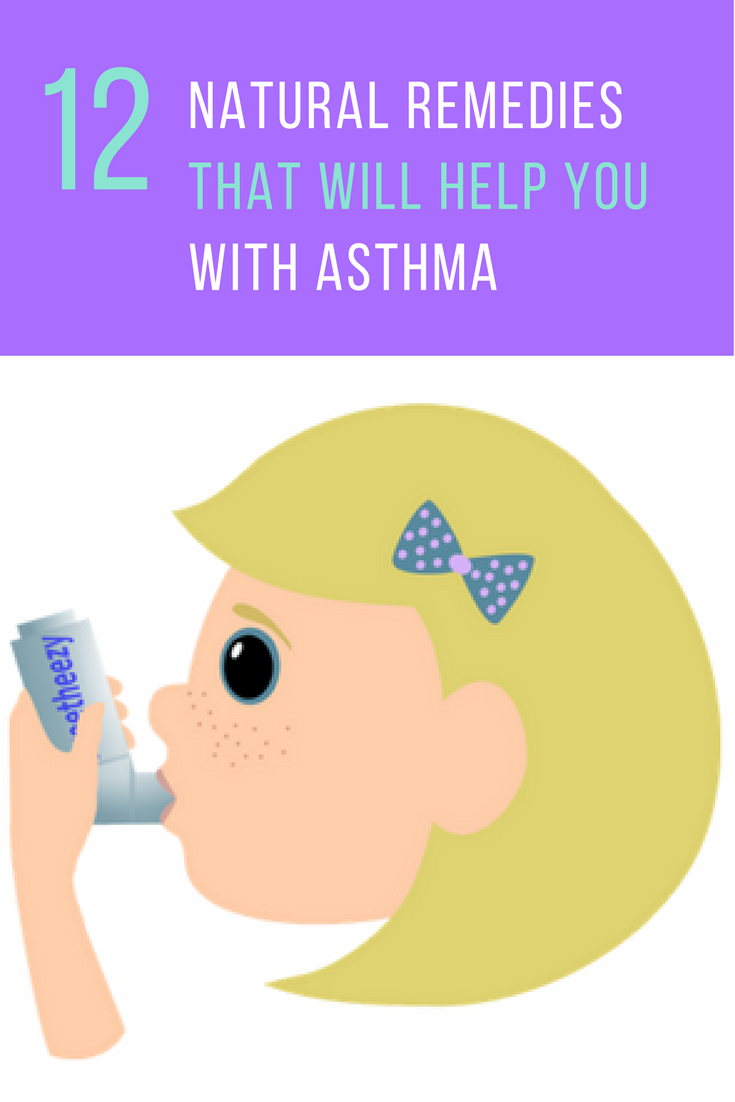
Asthma is a chronic and often debilitating condition that affects millions of Americans. Studies also show that the number of people with this condition has increased by 300 percent in just the last 20 years.
While medication and an inhaler help to alleviate symptoms and prevent an attack from becoming more serious or even life-threatening, it’s only natural for you to seek out more natural solutions.
Here are 12 natural remedies that can reduce asthma symptoms and improve your quality of life.

Stress Relief Is Paramount
The more stressed out you are, the more likely you are to either have an asthma attack (if they have stress-induced asthma) or experience complications during an asthma attack.
Wheezing, coughing and anxiety or even fear are some of the symptoms asthma sufferers have when stress is involved.
These kinds of strong physiological reactions can translate into increased airway restriction, which causes an asthma attack. Deep breathing exercises, aromatherapy, and even just taking time to relax can help lower stress levels.
Know and Understand Your Triggers
Figuring out what causes or triggers an asthma attack is essential to effectively managing your health. Keeping a diary of when and where each attack occurs is helpful for many people and can significantly increase the chances of figuring out what is behind each attack.
Some of the most common environmental causes are cigarette smoke, pollution, extreme cold and perfume. Once the precise triggers are known, you can make a conscious choice to avoid or reduce exposure to these problems.
It can also he helpful to provide friends and family with a list of these triggers so that they can make the necessary preparations when you visit with them.
Identifying Allergens Goes A Long Way
Your environment can also spark an asthma attack if your are allergic to something in it. Things like dust, mold, pet dander and pollen can cause serious problems for people with allergies, making them that must worse for those who suffer from asthma, as well as, asthma.
While there’s no way to make an environment 100 percent free of allergens, knowing what your allergens are, can help identify preventative measures that will reduce the likelihood of another asthma attack.
Parents of children with asthma may need to reduce the number of stuffed animals or pets in their children’s room, as both have been known to exacerbate asthma.
Vitamin C Does a Body Good
There are many studies that show a strong correlation between Vitamin C intake, or the lack of it, and asthma symptoms. Many doctors now believe that Vitamin C can help prevent and or relieve asthma symptoms thanks to its anti-inflammatory properties.
One study found that children with asthma who took 1 gram of Vitamin C, experienced less wheezing that those that did not take it.
Other studies suggest that taking the same amount each day could help keep bronchial airways open, thereby reducing the odds of an attack.
Smaller Meals, Bigger Results
Many people who have asthma also suffer from gastroesophageal reflux disease (GERD). In fact, according to research conducted at Duke University, this constitutes about 70% of sufferers.
One theory is that when stomach acid from GERD is released into the lungs, it causes changes in the immune system that can cause an asthma attack.
Eating smaller meals, which are less likely to trigger GERD symptoms, can help reduce this risk, as can avoiding spicy, acidic, fatty or caffeine rich foods. Asthma sufferers with GERD should also avoid laying down two to three hours after eating.
Sun Is Your Friend
Vitamin D is key to a healthy brain, muscles, bones, and lungs. As asthma is a disease of the lungs, getting more of this important nutrient can definitely make a difference in the quality of life for asthma sufferers.
This steroid hormone is absorbed by our skin whenever we are exposed to the sun.
Similarly, research has shown that children who lack vitamin D have a 50 percent higher risk of experiencing a severe asthma attack.
Some studies also show that a mother who receives a sufficient amount of vitamin D during pregnancy is less likely to have an asthmatic child. This video highlights the importance of Vitamin D for asthma sufferers.
Get Fit, Inside and Out
Being fit can positively influence many aspects of a person’s health, including asthma symptoms. While the precise relationship isn’t exactly clear, it is believed that the additional weight on the chest makes it harder to for it to expand properly, making asthma much worse.
Some research also shows a connection between obesity and inflammation in the body, which could make the bronchial inflammation worse in overweight asthma sufferers.
Eating right and getting at least 30 minutes of exercise each day can reduce these severity of an attack and lower the risk of other diseases and ailments in the body.
Yoga, One Breath at a Time
Breathing properly is a big part of practicing yoga. Learning to manage breathing is often helpful for those with asthma. In fact, many people may be surprised to learn that when properly taught, there are numerous techniques for breathing through your nose and mouth.
Yoga students often report significant improvement after a consistent routine of yoga. Best of all, yoga also helps with stress reduction, flexibility, and fitness so taking up this ancient practice could also yield improvement in other areas of your health as well.
Go with Ginger
Long touted as a cure-all for any number of illnesses, many people swear by its anti-inflammatory properties. Research conducted at Columbia University showed that the enzymes in ginger help relax the airway smooth muscle of the lungs.
This means more open airways in the lungs and easier breathing for those having an asthma attack.
In turn, this research also suggests that eating or drinking foods with ginger in them could make an asthma attack shorter, resulting in less time for recovery.
Likewise, as the Columbia study only used 30 to 40 percent of the ginger root, it should be easy to get a sufficient amount of ginger from everyday foods or drinks with ginger in them.
Explore the Ancient Herb Carom Seed
In naturalist communities, carom seed is often used to treat a host of respiratory problems including bronchitis, chest congestion and asthma.
It works as an expectorant so it helps to break up any mucus in the chest, making it easier for to expel if from the body through the mouth or nose.
Those mucus may not always be part of an asthma attack, this popular Asian herb can still be beneficial. Simply add some carom seeds to warm water and drink twice a day and its bronchialotor properties will go to work.
However, this should not be used a substitute for your inhaler in case of an attack.
Sip a Cup, or Two
Those who already enjoy this tasty beverage, may be relived to learn that it doing so can actually help improve their asthma symptoms. Coffee has antihistamine properties so it naturally helps your body suppress the urge to react to any perceived attack on the body, or in this case, the lungs.
Some studies show that just two cups of strong coffee can improve airway passage openings for up to four hours. It is unclear whether more coffee, ingested throughout the day, provides any additional benefits though it is unlikely to cause any harm.
Keeping track of your coffee consumption in your asthma diary may help you figure our if and how this natural remedy provides relief to you.
Say Yes to Omega-3 Fatty Acids
Inflammation is often the root cause of an asthma attack so anything that can reduce this harmful inflammation in the lungs is likely to help reduce asthma symptoms and improve recovery time should an attack occur.
Omega-3 fatty acids, which are found in salmon, mackerel, walnuts are especially good at fighting inflammation. In addition, several studies support these benefits so feel free to eat these healthful foods often as your asthma symptoms are likely to be significantly lessened.
Conclusion
Living with asthma, whether you’re young or old, represents some serious challenges. However, with the help of natural remedies you can alleviate some of your worst symptoms, reducing your reliance on medication and giving you more control over your health.
With the knowledge that you have about the remedies on this list, you can find the combination that best suits you, your lifestyle and your personal preferences.